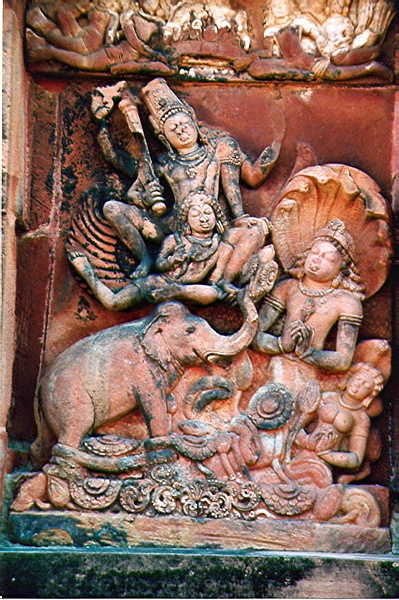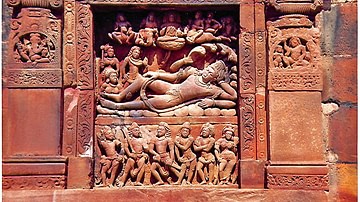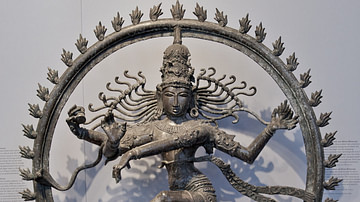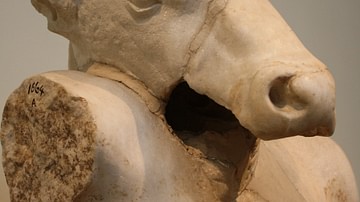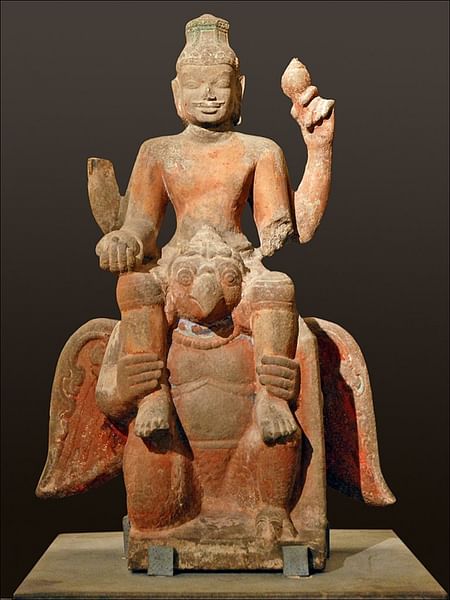
Garuda is a bird creature from Hindu mythology that has a mix of eagle and human features. He is the vehicle (vahana) of Vishnu and appears on the god's banner. Garuda represents birth and heaven, and is the enemy of all snakes. In Indian art, Garuda gradually acquired more human form over the centuries and so maintained only his wings. In Cambodia, however, he retains even today the great talons and vicious-looking beak of a bird of prey. Garuda is a national symbol of India, Indonesia and Thailand.
Appearance & Associations
The mythological bird creature Garuda traditionally has the torso and arms of a man and the wings, head, beak and talons of an eagle or vulture. His body is gold in colour, his wings are red and his face is white. Garuda is also known as the 'king of the birds' (Khagesvara), as 'he who has beautiful feathers' (Suparna), as 'golden bodied' (Suvarnakaya) and 'the devourer' (Nagantaka). The latter name is in reference to his role as the enemy of all snakes which are symbolic of death and the underworld. In contrast, Garuda represents birth and heaven; in addition he is associated with the sun and fire.
Garuda's wife is Unnati (or Vinayaka in other versions) and his son is Sampati, another mythical bird and ally of Rama. Garuda is the offspring of Kasyapa and Vinata (or also Tarksya in other versions). It was following his mother's quarrel with her co-wife Kadru, the queen of serpents, that Garuda acquired his dislike of snakes.
Mythological Adventures
In the Bhagavata Purana a legend is told where Garuda fights the fearsome many-headed snake Kaliya. Since long ago offerings were left for snakes during the first days of each month and a part of this offering was given by the snakes to Garuda. However, on one occasion Kaliya, thinking himself safe from Garuda because of his terrible poison, kept for himself all the offerings. Not best pleased at this impertinence, Garuda attacked Kaliya, hitting him so hard with his wings that Kaliya hid in a pool of the Kalindi River. Here Kaliya was safe because the sage Saubhari had once cursed Garuda for stealing one too many fish from the river, and if Garuda ever entered its waters again he would immediately expire. Kaliya would later get his comeuppance though as Krishna swam into the pool and chastised him by stamping on each of his many heads.
In the Mahabharata Garuda eats evil men. In one episode he swallowed a brahmana and his wife but the priest burned Garuda's throat so much that he was compelled to spit the couple out.
In perhaps the most famous episode from Hindu mythology involving Garuda, the giant bird attempted to steal from the gods the sacred amrta or 'water of life'. Indra soon found out and, unconvinced by Garuda's motive that he needed the amrta as a ransom to free his mother from the clutches of Kadru, fought the giant bird in an epic battle. Mighty Indra lost his famous thunderbolt in the clash but eventually managed to retrieve the amrta.
In another story, Garuda once came to the aid of a sparrow that had been taken advantage of by the Ocean. The sparrow had laid her eggs on the beach but Ocean carried them away with his waves. Begging to no avail to have the eggs returned, the sparrow pecked at the edge of the Ocean to encourage him to return what was not his. The determined sparrow became famous for her persistence and so caught the attention of Garuda who, as king of the birds, felt sympathy and threatened the Ocean that if the eggs were not given back then Garuda himself would incessantly attack the Ocean. Ocean relented and returned the eggs to the ever grateful sparrow.
Garuda in Art
Garuda often appears in sculptural representations of Vishnu (Garudasana Visnu), especially on columns such as the 5th century CE Eran column in Madhya Pradesh which has two figures of Garuda, unusually with human heads as opposed to the typical eagle ones. The 6.5 metre high sandstone column at Besnagar, which dates to at least the 1st century BCE, is also thought to have once been topped by a figure of Garuda.
In Nepalese art, Garuda usually has a youth's face and he often wears his wings like a cloak. The earliest complete example is from Cangu Narayana which dates to the 6th-7th century CE. In Cambodia, where Garuda is known as Kruth, he has a human torso and fearsome clawed feet. In each hand he clutches a snake and is a common figure in architectural sculpture, notably at Angkor, but also frequently as a wooden support at the corners of the roofs of temple buildings.
